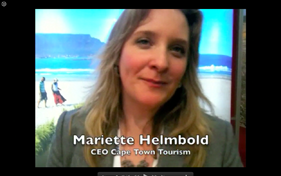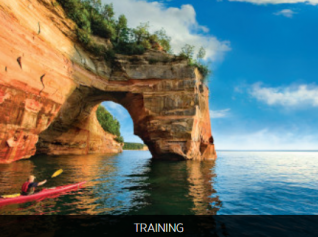Mariette writes about Berlin

Cape Town tourism boss sets out highlights and predictions from ITB2011
ITB Berlin is the world’s leading travel trade show, with some 100 000 trade visitors and more than 60 000 members of the public set to visit between March 9 and 13, 2011. This year there is also a record number of participating exhibitors – 188 countries and a total of 11 163 exhibiting companies and organisations. The media, trade and travelling public are spoiled for choice. Writes Mariette du Toit Helmbold, CEO of Cape Town Tourism
Running parallel to the trade fair is the ITB Berlin Convention, the largest travel industry event of its kind in the world, from March 9 to 11, 2011.
Cape Town Tourism attended the “Future Day” Convention of ITB, where attendees and exponents reflected on the global mega trends affecting people’s travel behaviour and choices, and glimpsed at how these will shape future travel patterns.
Here are some of the highlights and predictions that I found most relevant for Cape Town and the future of travel:
The three most relevant mega trends affecting the tourism industry are globalisation, demographic change of our customers, and climate change.
With 935-million trips taken in 2010, world tourism is firmly on the growth path. Those destinations hoping for a full recovery, a return to the travel market that they were used to before the recession, however, are in for a rude awakening. The world is a different place and people’s travel behaviour has changed fundamentally.
Growth is being driven by emerging markets such as Asia and South America, while mature markets are seeing low growth. In China, 400-million people have come out of poverty in the last few years. In India, there are 150-million people. Demand-driven markets are being created. These are the world’s new middle class travellers.
World travel in 2011 is predicted to grow by 3 to 4%, with most confidence in Asia and South America. China and India are the economic powerhouses of the future and Asia is expected to see a double-digit outbound growth in 2011. Around 46-million Chinese travelled abroad last year, as did over 4-million Indians. As nations grow, so does their exposure and disposable income, leading to trips farther afield. There is a huge opportunity in these new markets for Cape Town, especially during our off-peak winter months, but we should not rush in without a plan and without understanding more about these new customers.
Destinations must understand how new travel behaviour will impact on us and we must adjust our marketing, communication and offerings to meet the needs of our customers. It is about the customer, not the destination. Once we get this, we can influence their travel choices. Interesting new travel behaviour includes:
“Too busy to care” travellers who cannot be bothered to give destinations or products feedback.
- Those with complex lives and pressurised finances. With the average world citizen earning less than they did 10 years ago and low birth rates in developed countries, people are working harder and leisure time is shrinking. Time is now our most precious commodity.
- People are craving simplicity and a return to basics. Slow living, slow food and slow travel are growing, and will continue to do so.
- Certain wealthy travellers are getting harder to please and are demanding more and more from the destinations they visit.
- Sustainability is no longer a nice-to-have, but a need-to-have. With the world heading towards massive overcapacity and shrinking demand in traditional markets, destinations and businesses have no choice but to ensure sustainable tourism practices cascade throughout their operations and offerings.
Climate change is not only directly affecting the cost of aviation, but it is also speaking to people’s moral values. More and more people will question the acceptability of flying long haul for recreational or leisure purposes. Cape Town as a long-haul destination must be able to answer these tough questions and promote sustainable local experiences to offset long-haul travel. It is predicted that individual carbon budgets could be in the pipeline. We must be ready for dramatic change in this arena.
Despite positive outlook and economic growth, all indications are that tourists around the world are still being careful with their money. Total spending by international travellers is expected to increase by 7% to €781-billion this year, the World Travel Monitor found. Average spending per night is expected to be €107 while spending per trip will be €1 141. Big spenders this year in terms of international tourism expenditure include China (+22%), the Russian Federation (+26%) and Brazil (+54%), according to United Nations World Tourism Organisation figures.
New skills and talent will be required within the tourism sector if destinations and operators hope to make the most of the new global travel arena. The signs of an economic recovery are positive, but risk will always remain. The skill to scan the horizon for change and the ability to anticipate change are important. We must get closer to our customers. By allowing the customer to give us ideas and answers to our questions, we can move from idea to implementation much quicker.
Businesses must become laboratories of ideas by using their customers and attracting and nurturing young and diverse talent. Those destinations and businesses that are willing to open the door to the future and stay curious about what makes their customers tick will lead the way to prosperity.
The science of neuromarketing in destination and tourism experience marketing, advertising and communication has tremendous potential for destination marketing organisations like Cape Town Tourism and the industry. Neuromarketing recognises that up to 95% of all decisions are made on a subconscious level. It asks questions like: “How do consumers’ subconscious minds react to destination advertising?” and “What are the different consumer types and what travel decisions do they make?” Researchers around the world are searching for the latest secrets of our purchase decisions, and a growing number of destination marketing agencies are putting their findings into practice by selecting imagery and language that speaks directly to subconscious decision-making patterns. Neuromarketing recognises implicit personality systems that dictate what’s important to the customer. So far, four different personality types have been identified. Understanding your customer and what makes them unique will make it possible to match your destination and experiences to the right customer, resulting in a much better conversion rate. These personality profiles are:
- The economical customer, who relates to data, facts and efficiency
- The relationship customer, who relates to harmony, partnership, a more personal approach and trust
- The trendsetter customer, who relates to opportunities, gut feelings and creativity
- The exclusive customer, who relates to aesthetics, quality and vision
The most interesting innovation in tourism marketing is the ability to communicate in an instant, relevant and personalised way with customers. The internet and social media in particular allow us to personalise relevant information for our customers and share it instantly with them.
Cape Town Tourism has opened our doors wide to let the future in and is curious to learn more about what makes the Futourist tick. We will bring you more news and lessons from ITB in due course.
Mariette du Toit Helmbold
Also from South Africa:
&Beyond has produced a set of 13 sustainability booklets titled ‘Give more take less’ to add to the informative wildlife collateral included in suites at the group’s African lodges.
The booklets explain &Beyond’s responsible, sustainable operating ethos and the developmental expertise that the &Beyond Foundation brings to ensuring communities lead their own development.
Designed in A5 format, each booklet covers a lodge or region-specific conservation and research victories, sustainability measures that reduce the negative impact of lodges on the environment or save precious commodities, plus the practice of measuring eco overheads that is in place at all &Beyond lodges. Fields that are measured include petrol, diesel, generator fuel, electricity, gas, paraffin, wood charcoal, water waste, recycled water and recycled waste. This captured data is analysed and leads to corrective measures and tactics at a local level.
The booklets also highlight &Beyond Foundation projects completed by local communities as well as initiatives that are in the pipeline and illustrate that 80-100% of all donations go directly to projects surrounding the group’s lodges.
“Increasingly our feedback forms indicate that &Beyond guests want to know more about the conservation and environmental measures that are in place at the lodges they visit, and about the meaningful benefits for local communities that flow both directly and indirectly from their travel spend with us,” says Claire Howse.
Valere Tjolle
Valere Tjolle is editor of the Sustainable Tourism Report Suite. Get FREE contents guide to Sustainable Destination Report CLICK HERE: Special Offer on Sustainable Tourism Marketing Guide CLICK HERE Special Offer on Sustainable Tourism Ministers Briefing CLICK HERE
 United Kingdom
United Kingdom United States
United States Asia Pacific
Asia Pacific












































EU airports bring back 100ml liquid rule
British Airways passengers endure 11-hour 'flight to nowhere'
CLIA: Anti-cruise demos could cause itinerary changes in Europe
Co-pilot faints, easyJet flight issues ‘red alert’
Gatwick braces for strike